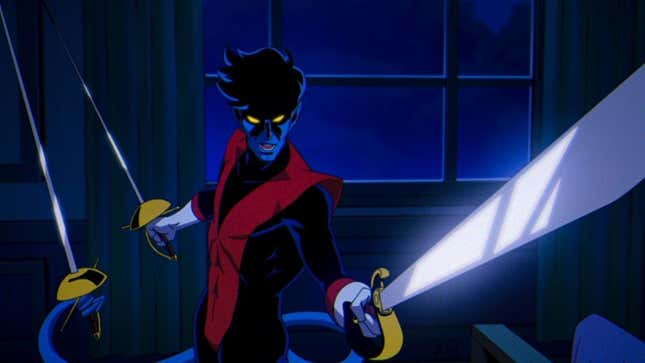The eighth episode of X-Men ‘97 is the beginning of the end, at least for the show’s first season. “Tolerance Is Extinction – Part 1” is the first chapter in the show’s three-part finale. That puts the episode in a tough spot, as it needs to begin the work of tying together the show’s many threads, and reuniting its large ensemble. Overall, it’s a great showcase for X-Men ‘97’s stunning animation thanks to some high-octane action, but narratively it feels weaker than the rest of the series due to so much setup. But a last-minute cliffhanger promises to get things back on track.
The first part of the finale hits the ground running after the previous episode’s reveal that Bastion is this season’s big bad. He’s a character with a complex backstory in the comics, but simply put he’s a mutant-hating guy who is part man and part super-advanced sentinel. Learning about his origins is one of the main plot points of this episode, as Cyclops, Jean, and Cable try to figure out what they are up against. This leads to an interesting history lesson about Bastion’s relationship with Cable’s distant future, as well as his own troubled upbringing that in many ways mirrors the mutant plight.
Like the rest of the show’s interpretation of classic stories and characters from the comics, it’s an interesting take. The problem is that the show doesn’t give this backstory time to breathe, and soon enough a zombified sentinel army starts attacking our heroes. That leads to a plane chase which leads to a car chase (sponsored by Porsche! Which Cable somehow still associates with “cool as fuck car” even hundreds of years in the future). At the same time, Logan, Nightcrawler, and Beast defend the X-Mansion. The show highlights its stunning animation, as both teams get some great action sequences, and it’s undeniably badass watching Nightcrawler fight with three swords (he wields the third with his tail).

X-Men ‘97 rushes its key plots
Breaking the series finale into three parts would, you’d think, give the conclusion plenty of time to tell an interesting story. But “Tolerance Is Extinction – Part 1” rushes through the plot. Like past episodes, it left me wondering why they are choosing to adapt certain stories if they are going to give them so little time. The most compelling part of this episode is the C-plot, which follows Jubilee and Roberto. These two have been the undersung heart of X-Men ‘97 and that continues with the latest episode. Watching Roberto confront his mutant identity is endlessly compelling, both in seeing the little joys he finds thanks to Jubilee’s guidance, as well as the poor treatment he receives from those around him—including his own family. It’s heart-wrenching to see Roberto’s mother essentially hand him over to radical militants due to his identity.
Though again, this all happens rather quickly as the episode struggles to balance all the plates it has spinning. In some ways, it’s a blessing that the show runs through so much of the Bastion-centric plot, as it is in many ways just as boring as Operation: Zero Tolerance, the comic on which it’s heavily based. Thankfully, by the end we get back to the narrative ambition X-Men ‘97 has previously been full of. Magneto escapes from his imprisonment, and after facing the genocide of his people (again) he is done trying to play Charles’ game of making peace with humanity. So he declares war. This incredible cliffhanger also drops one of the hardest lines from X-Men history—Magneto was right. In the context of X-Men ‘97, this line hits harder than ever. It’s a mic drop moment that gave me chills.
So much of this show has been about Magneto holding himself back while pointing to the atrocities around him, saying “I told you so.” Now he gets to let loose. The only worry I have is that the last-minute return of Charles to Earth threatens to let X-Men ‘97 devolve into the most tired conflict in mutantdom— Charles vs Magneto. Too often Charles represents the comfortable idea of a non-disruptive revolution, the idea that the persecuted people of the world must be peaceful and cooperate, despite all the violence done to them. Magneto’s willingness to work more realistically towards true revolutionary change, including using violence against the oppressor, is an uncomfortable concept to the norms of society. It’s why he’s so often reduced to a cardboard villain. Here’s hoping X-Men ‘97 avoids that pitfall and can acknowledge the truth — Magneto is right.
.
